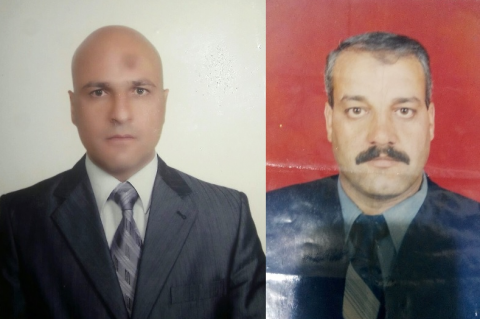
Since the beginning of the six-year long armed conflict, thousands people have become victims of enforced disappearances and security services have abducted many of them at checkpoints. Last week, Alkarama submitted to the United Nations Working Group on Enforced Disappearances (WGEID) three cases of disappearances which follow the same pattern, hoping that the five experts’ intervention with the Syrian authorities will help shed light on the victims’ fate and whereabouts.
On 24 October 2012, Waleed and Khodor Al Ahmad, two cousins from Ghanya village in Idlib governorate, both employed at Jisr Al Shughur municipality, were travelling from home to work when they reached a checkpoint controlled by the National Defence Forces, a pro-Assad militia, situated in Ishtabraq village, near Jisr Al Shughur. Militiamen, both in military uniforms and civilian clothes stopped their car and brought the two cousins away.
Following their abduction, their family inquired with different security services, including the Air Force Intelligence in late 2012, to no avail. However, former detainees referred having seen them in January 2013 in Deir Shamil detention centre controlled by the Air Forces Intelligence in Masyaf, Hama governorate, and in Hama prison in December 2015.
Similarly, on 20 March 2013, Hatem Al Mohammad, a farmer aged 38 at the time, was travelling back home, in Karatin Al Kabir, Idlib governorate, from Al Qusayr, a town south of Homs, where he had been harvesting. When he reached an Air Force Intelligence checkpoint located in Homs, he was stopped and arrested by the security officers who took him to an unknown location.
Al Mohammad’s family was later informed that a former detainee last saw him in the Air Forces Intelligence branch in Homs in November 2013. However, despite his family’s inquiries with different security branches, including the Military Police in Qaboun neighbourhood in Damascus, they were never provided with any official information by the authorities. They therefore contacted Alkarama and Human Rights Guardians, who, in turn, informed the UN experts.
“We are extremely concerned over the fate of Al Mohammad and Al Ahmad cousins, as well as for the other thousands of victims of enforced disappearances in Syria,” says Inès Osman, Legal Officer for the Mashreq at Alkarama. “Checkpoints have allowed the Syrian authorities to carry out a policy of widespread and systematic enforced disappearances, which amount to a crime against humanity. It is now time that the Syrian authorities put an end to this heinous practice.”
For more information or an interview, please contact media@alkarama.org (Dir: +41 22 734 1008).
